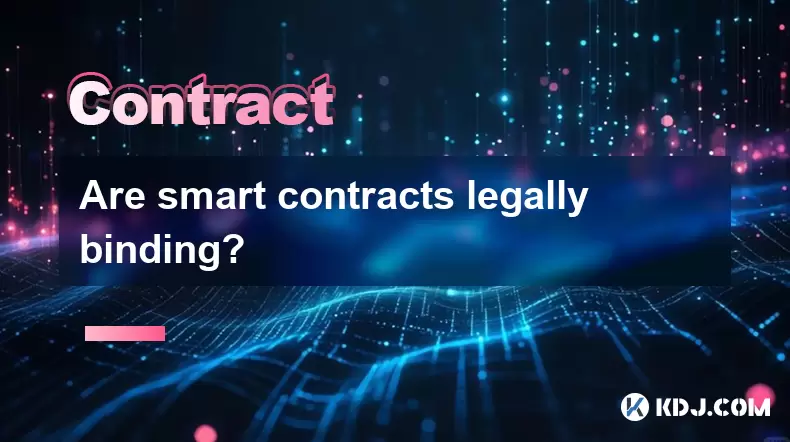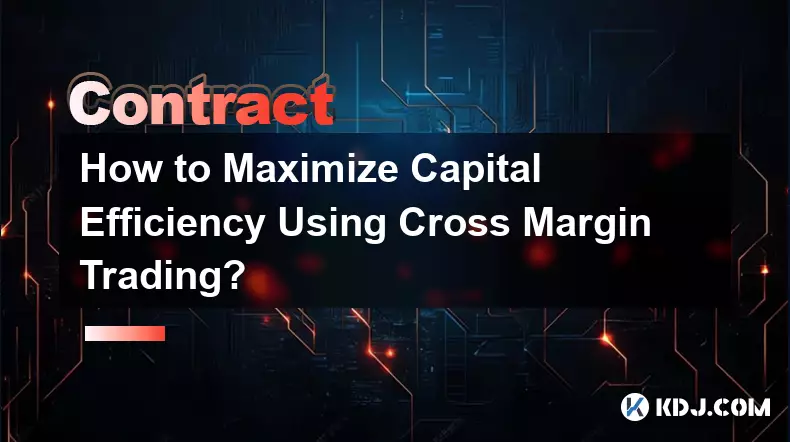-
 bitcoin
bitcoin $87959.907984 USD
1.34% -
 ethereum
ethereum $2920.497338 USD
3.04% -
 tether
tether $0.999775 USD
0.00% -
 xrp
xrp $2.237324 USD
8.12% -
 bnb
bnb $860.243768 USD
0.90% -
 solana
solana $138.089498 USD
5.43% -
 usd-coin
usd-coin $0.999807 USD
0.01% -
 tron
tron $0.272801 USD
-1.53% -
 dogecoin
dogecoin $0.150904 USD
2.96% -
 cardano
cardano $0.421635 USD
1.97% -
 hyperliquid
hyperliquid $32.152445 USD
2.23% -
 bitcoin-cash
bitcoin-cash $533.301069 USD
-1.94% -
 chainlink
chainlink $12.953417 USD
2.68% -
 unus-sed-leo
unus-sed-leo $9.535951 USD
0.73% -
 zcash
zcash $521.483386 USD
-2.87%
Are smart contracts legally binding?
Smart contracts, while self-executing and code-based, are legally binding only if they meet traditional contract law requirements like offer, acceptance, and legality.
Jul 16, 2025 at 09:50 am

Understanding the Legal Nature of Smart Contracts
Smart contracts are self-executing agreements with the terms of the contract directly written into code. They automatically execute actions when predefined conditions are met, eliminating the need for intermediaries in many cases. However, the question of whether smart contracts are legally binding hinges on how existing legal systems interpret them. Most jurisdictions do not yet have specific laws that define smart contracts as standalone legal entities. Instead, they fall under general contract law principles, meaning their enforceability depends on meeting traditional legal requirements such as offer, acceptance, consideration, and legality of purpose.
In many countries, including the United States and members of the European Union, smart contracts can be considered legally binding if they satisfy these fundamental criteria.
Jurisdictional Differences in Legal Recognition
The legal status of smart contracts varies significantly across different jurisdictions. For example, Arizona, Tennessee, and Wyoming in the U.S. have enacted laws recognizing blockchain-based contracts as valid and enforceable under state law. These states allow smart contracts to be used in court proceedings and accept them as evidence in disputes. In contrast, other regions may lack clear regulatory guidance, leaving their enforceability uncertain.
Switzerland has also taken a progressive stance, treating smart contracts as valid legal instruments provided they comply with Swiss civil law standards.
In contrast, countries like China have imposed restrictions on cryptocurrency-related activities, which indirectly affects the legal standing of smart contracts tied to crypto transactions.
Challenges in Enforcing Smart Contracts Legally
Despite their programmable nature, smart contracts pose unique challenges when it comes to enforcement. Since they operate autonomously once deployed, issues such as coding errors, bugs, or unexpected outcomes can lead to disputes. Traditional legal systems are not always equipped to handle disputes involving decentralized autonomous organizations (DAOs) or immutable blockchain records.
- One major challenge is determining liability when a smart contract executes incorrectly due to a coding error.
- Another issue arises from the pseudonymous nature of blockchain users, making it difficult to identify parties involved in a dispute.
- Jurisdictional conflicts can occur when parties reside in different countries with varying legal frameworks.
These complexities highlight the need for legal professionals to adapt to new technologies while ensuring that smart contracts align with established legal norms.
The Role of Code vs. Natural Language Agreements
A critical aspect of smart contracts is the potential discrepancy between the code that governs execution and any accompanying natural language agreement. While the code may be unambiguous in its logic, human-readable contracts might include clauses that are open to interpretation. This divergence can create confusion about the actual intent of the parties involved.
Courts typically rely on textual contracts to determine intent, but smart contracts present a novel challenge where the code itself becomes the contract.
Some legal scholars argue that hybrid contracts—those that combine both coded and written components—may offer a more robust solution by providing clarity in both technical and legal contexts.
How Courts Have Treated Smart Contract Disputes
Although there are relatively few high-profile court cases involving smart contracts, some precedents provide insight into how legal systems might approach them. In one notable case, a U.S. judge ruled that a smart contract executed on the Ethereum blockchain was enforceable, acknowledging the legitimacy of the code-based agreement.
However, courts often require additional evidence beyond the code itself, such as communication logs, transaction records, or expert testimony regarding the contract's functionality.
This suggests that while smart contracts may be recognized as valid agreements, proving their fairness, accuracy, and compliance remains a complex process.
Frequently Asked Questions (FAQ)
Q: Can a smart contract override traditional contract law?No, smart contracts must still conform to existing contract laws. If a smart contract violates legal principles, such as those governing fraud or public policy, it may not be enforceable in court.
Q: Are all smart contracts legally enforceable?Not necessarily. A smart contract’s enforceability depends on whether it meets legal requirements, including mutual consent, lawful subject matter, and capacity of the parties involved.
Q: What happens if a smart contract contains a bug?If a bug causes unintended consequences, affected parties may seek legal remedies. However, because smart contracts are typically immutable, fixing errors after deployment can be extremely difficult.
Q: How do I ensure my smart contract is legally sound?To enhance legal validity, it’s advisable to consult legal counsel before deployment, maintain off-chain documentation, and ensure compliance with applicable regulations in your jurisdiction.
Disclaimer:info@kdj.com
The information provided is not trading advice. kdj.com does not assume any responsibility for any investments made based on the information provided in this article. Cryptocurrencies are highly volatile and it is highly recommended that you invest with caution after thorough research!
If you believe that the content used on this website infringes your copyright, please contact us immediately (info@kdj.com) and we will delete it promptly.
- Bitcoin Drops Amidst Analyst Warnings and Shifting Market Sentiment
- 2026-02-05 09:40:02
- Georgia Brothers Sentenced to 20 Years for Elaborate COAM Gambling Fraud Scheme
- 2026-02-05 09:45:01
- MicroStrategy Stock Loss: Pension Funds Face 60% Plunge Amidst Crypto Volatility
- 2026-02-05 10:55:01
- Super Bowl LX: Teddy Swims, Green Day, and a Legacy Toss Set for 2026 Extravaganza
- 2026-02-05 07:20:02
- Fantasy Football Premier League Round 25: Key Player Picks, Tips, and Advice for Optimal Team Performance
- 2026-02-05 07:15:02
- Remittix Launches PayFi Platform with a Generous 300% Bonus Offer, Driving Investor Excitement
- 2026-02-05 07:05:01
Related knowledge

How to Manage Emotions and "Revenge Trading" in Futures?
Feb 05,2026 at 12:19am
Understanding Emotional Triggers in Futures Markets1. Market volatility directly impacts psychological states, often amplifying fear or euphoria based...

How to Analyze Market Sentiment Using the Fear and Greed Index?
Feb 05,2026 at 07:40am
Understanding the Fear and Greed Index1. The Fear and Greed Index is a composite metric designed to quantify prevailing emotional states among cryptoc...

How to Use Volume Profile to Find Key Futures Entry Levels?
Feb 04,2026 at 11:39pm
Understanding Volume Profile Structure1. Volume Profile displays the distribution of traded volume at specific price levels over a defined time period...

How to Trade Bitcoin Futures with 100x Leverage? (High-Risk Setup)
Feb 05,2026 at 11:00am
Understanding Bitcoin Futures Mechanics1. Bitcoin futures contracts represent agreements to buy or sell BTC at a predetermined price and date in the f...

How to Maximize Capital Efficiency Using Cross Margin Trading?
Feb 05,2026 at 12:40am
Cross Margin Trading Fundamentals1. Cross margin trading allows traders to use their entire account balance as collateral for open positions across mu...

How to Trade Crypto Contracts During Major News Events? (CPI/FOMC)
Feb 05,2026 at 09:59am
Understanding Market Sensitivity to Macro Data Releases1. Cryptocurrency futures markets exhibit pronounced volatility during U.S. CPI and FOMC announ...

How to Manage Emotions and "Revenge Trading" in Futures?
Feb 05,2026 at 12:19am
Understanding Emotional Triggers in Futures Markets1. Market volatility directly impacts psychological states, often amplifying fear or euphoria based...

How to Analyze Market Sentiment Using the Fear and Greed Index?
Feb 05,2026 at 07:40am
Understanding the Fear and Greed Index1. The Fear and Greed Index is a composite metric designed to quantify prevailing emotional states among cryptoc...

How to Use Volume Profile to Find Key Futures Entry Levels?
Feb 04,2026 at 11:39pm
Understanding Volume Profile Structure1. Volume Profile displays the distribution of traded volume at specific price levels over a defined time period...

How to Trade Bitcoin Futures with 100x Leverage? (High-Risk Setup)
Feb 05,2026 at 11:00am
Understanding Bitcoin Futures Mechanics1. Bitcoin futures contracts represent agreements to buy or sell BTC at a predetermined price and date in the f...

How to Maximize Capital Efficiency Using Cross Margin Trading?
Feb 05,2026 at 12:40am
Cross Margin Trading Fundamentals1. Cross margin trading allows traders to use their entire account balance as collateral for open positions across mu...

How to Trade Crypto Contracts During Major News Events? (CPI/FOMC)
Feb 05,2026 at 09:59am
Understanding Market Sensitivity to Macro Data Releases1. Cryptocurrency futures markets exhibit pronounced volatility during U.S. CPI and FOMC announ...
See all articles










































































